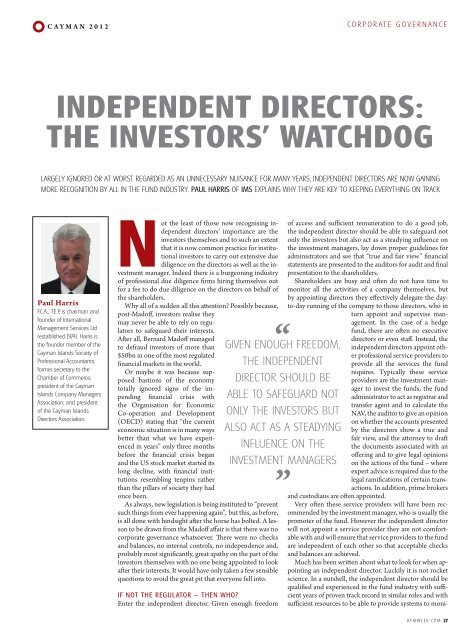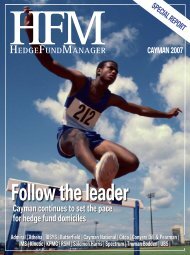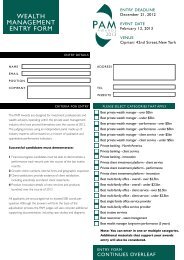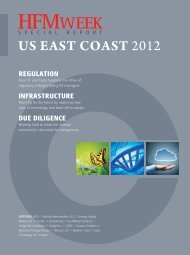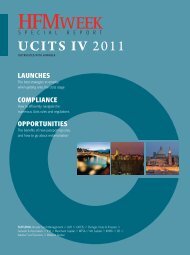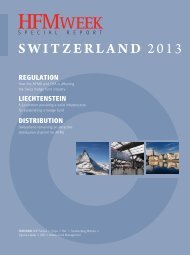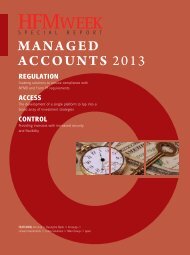CAYMAN 2012 - HFMWeek
CAYMAN 2012 - HFMWeek
CAYMAN 2012 - HFMWeek
- No tags were found...
You also want an ePaper? Increase the reach of your titles
YUMPU automatically turns print PDFs into web optimized ePapers that Google loves.
<strong>CAYMAN</strong> <strong>2012</strong><br />
CORPORATE GOVERNANCE<br />
INDEPENDENT DIRECTORS:<br />
THE INVESTORS’ WATCHDOG<br />
LARGELY IGNORED OR AT WORST REGARDED AS AN UNNECESSARY NUISANCE FOR MANY YEARS, INDEPENDENT DIRECTORS ARE NOW GAINING<br />
MORE RECOGNITION BY ALL IN THE FUND INDUSTRY. PAUL HARRIS OF IMS EXPLAINS WHY THEY ARE KEY TO KEEPING EVERYTHING ON TRACK<br />
Paul Harris<br />
F.C.A., T.E.P. is chairman and<br />
founder of International<br />
Management Services Ltd<br />
(established 1974). Harris is<br />
the founder member of the<br />
Cayman Islands Society of<br />
Professional Accountants;<br />
former secretary to the<br />
Chamber of Commerce;<br />
president of the Cayman<br />
Islands Company Managers<br />
Association; and president<br />
of the Cayman Islands<br />
Directors Association.<br />
Not the least of those now recognising independent<br />
directors’ importance are the<br />
investors themselves and to such an extent<br />
that it is now common practice for institutional<br />
investors to carry out extensive due<br />
diligence on the directors as well as the investment<br />
manager. Indeed there is a burgeoning industry<br />
of professional due diligence firms hiring themselves out<br />
for a fee to do due diligence on the directors on behalf of<br />
the shareholders.<br />
Why all of a sudden all this attention Possibly because,<br />
post-Madoff, investors realise they<br />
may never be able to rely on regulators<br />
to safeguard their interests.<br />
After all, Bernard Madoff managed<br />
to defraud investors of more than<br />
$50bn in one of the most regulated<br />
financial markets in the world.<br />
Or maybe it was because supposed<br />
bastions of the economy<br />
totally ignored signs of the impending<br />
financial crisis with<br />
the Organisation for Economic<br />
Co-operation and Development<br />
(OECD) stating that “the current<br />
economic situation is in many ways<br />
better than what we have experienced<br />
in years” only three months<br />
before the financial crisis began<br />
and the US stock market started its<br />
long decline, with financial institutions<br />
resembling tenpins rather<br />
than the pillars of society they had<br />
once been.<br />
As always, new legislation is being instituted to “prevent<br />
such things from ever happening again”, but this, as before,<br />
is all done with hindsight after the horse has bolted. A lesson<br />
to be drawn from the Madoff affair is that there was no<br />
corporate governance whatsoever. There were no checks<br />
and balances, no internal controls, no independence and,<br />
probably most significantly, great apathy on the part of the<br />
investors themselves with no one being appointed to look<br />
after their interests. It would have only taken a few sensible<br />
questions to avoid the great pit that everyone fell into.<br />
IF NOT THE REGULATOR – THEN WHO<br />
Enter the independent director. Given enough freedom<br />
GIVEN ENOUGH FREEDOM,<br />
THE INDEPENDENT<br />
DIRECTOR SHOULD BE<br />
ABLE TO SAFEGUARD NOT<br />
ONLY THE INVESTORS BUT<br />
ALSO ACT AS A STEADYING<br />
INFLUENCE ON THE<br />
INVESTMENT MANAGERS<br />
”<br />
of access and sufficient remuneration to do a good job,<br />
the independent director should be able to safeguard not<br />
only the investors but also act as a steadying influence on<br />
the investment managers, lay down proper guidelines for<br />
administrators and see that “true and fair view” financial<br />
statements are presented to the auditors for audit and final<br />
presentation to the shareholders.<br />
Shareholders are busy and often do not have time to<br />
monitor all the activities of a company themselves, but<br />
by appointing directors they effectively delegate the dayto-day<br />
running of the company to those directors, who in<br />
turn appoint and supervise management.<br />
In the case of a hedge<br />
fund, there are often no executive<br />
directors or even staff. Instead, the<br />
independent directors appoint other<br />
professional service providers to<br />
provide all the services the fund<br />
requires. Typically these service<br />
providers are the investment manager<br />
to invest the funds, the fund<br />
administrator to act as registrar and<br />
transfer agent and to calculate the<br />
NAV, the auditor to give an opinion<br />
on whether the accounts presented<br />
by the directors show a true and<br />
fair view, and the attorney to draft<br />
the documents associated with an<br />
offering and to give legal opinions<br />
on the actions of the fund – where<br />
expert advice is required due to the<br />
legal ramifications of certain transactions.<br />
In addition, prime brokers<br />
and custodians are often appointed.<br />
Very often these service providers will have been recommended<br />
by the investment manager, who is usually the<br />
promoter of the fund. However the independent director<br />
will not appoint a service provider they are not comfortable<br />
with and will ensure that service providers to the fund<br />
are independent of each other so that acceptable checks<br />
and balances are achieved.<br />
Much has been written about what to look for when appointing<br />
an independent director. Luckily it is not rocket<br />
science. In a nutshell, the independent director should be<br />
qualified and experienced in the fund industry with sufficient<br />
years of proven track record in similar roles and with<br />
sufficient resources to be able to provide systems to moni-<br />
HFMWEEK.COM 27


